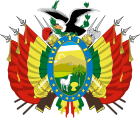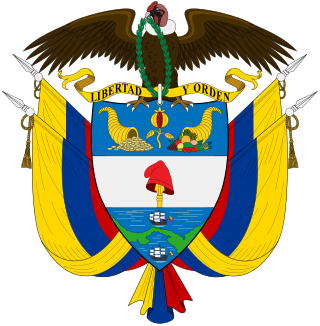 |
|---|
A constitutional referendum was held in Bolivia on 11 January 1931. [1] Voters were asked whether they approved of nine separate proposed amendments to the constitution, all of which were approved.
 |
|---|
A constitutional referendum was held in Bolivia on 11 January 1931. [1] Voters were asked whether they approved of nine separate proposed amendments to the constitution, all of which were approved.
On 24 June 1930 General Carlos Blanco Galindo led a military coup to oust President Hernando Siles Reyes. The military junta subsequently proposed several constitutional changes and fresh elections. A decree was issued on 27 November 1930 ordering a referendum on 28 December. However, it was later postponed. Elections were held on 4 January. [1]
Blank votes were added to the "yes" votes. Voting was restricted to certain level of income or assets, whilst women and illiterate men were barred from voting. [1]
The proposals included: [1]
| Proposal | For | Against | Invalid/ blank | Total | Registered voters | Turnout | ||
|---|---|---|---|---|---|---|---|---|
| Votes | % | Votes | % | |||||
| 1 | 88.0 | 12.0 | 90,000 | |||||
| 2 | 88.0 | 12.0 | 90,000 | |||||
| 3 | 88.0 | 12.0 | 90,000 | |||||
| 4 | 88.0 | 12.0 | 90,000 | |||||
| 5 | 88.0 | 12.0 | 90,000 | |||||
| 6 | 88.0 | 12.0 | 90,000 | |||||
| 7 | 22,458 | 78.2 | 6,251 | 21.8 | 90,000 | |||
| 8 | 88.0 | 12.0 | 90,000 | |||||
| 9 | 88.0 | 12.0 | 90,000 | |||||
| Source: Direct Democracy | ||||||||
The National Congress were opposed to the referendum as it had not been carried out in accordance with the constitution, but ratified the approved proposals. The changes went into effect on 23 February, although the changes on election of the President and autonomy of universities were dropped. [1]

The Legislative Yuan is the unicameral legislature of the Republic of China (Taiwan) located in Taipei. The Legislative Yuan is composed of 113 members, who are directly elected for four-year terms by people of the Taiwan Area through a parallel voting system.

The National Assembly was the authoritative legislative body of the Republic of China, commonly referred to as Taiwan after 1949, from 1947 to 2005. Along with the Control Yuan and the Legislative Yuan, the National Assembly formed the tricameral parliament of China. If still functional, at 3,045 members, the National Assembly would have been the largest parliamentary chamber in the world.

The Constitution of the Republic of China is the fifth and current constitution of the Republic of China (ROC), ratified by the Kuomintang during the Constituent National Assembly session on 25 December 1946, in Nanjing, and adopted on 25 December 1947. The constitution, along with its Additional Articles, remains effective in ROC-controlled territories.
A constitutional amendment is a modification of the constitution of a polity, organization or other type of entity. Amendments are often interwoven into the relevant sections of an existing constitution, directly altering the text. Conversely, they can be appended to the constitution as supplemental additions, thus changing the frame of government without altering the existing text of the document.

The Spanish Constitution is the supreme law of the Kingdom of Spain. It was enacted after its approval in a constitutional referendum, and it is the culmination of the Spanish transition to democracy. The Constitution of 1978 is one of about a dozen of other historical Spanish constitutions and constitution-like documents; however, it is one of two fully democratic constitutions. It was sanctioned by King Juan Carlos I on 27 December, and published in the Boletín Oficial del Estado on 29 December, the date on which it became effective. The promulgation of the constitution marked the culmination of the Spanish transition to democracy after the death of general Francisco Franco, on 20 November 1975, who ruled over Spain as a military dictator for nearly 40 years. This led to the country undergoing a series of political, social and historical changes that transformed the Francoist regime into a democratic state.

The Congress of the Republic of Colombia is the name given to Colombia's bicameral national legislature.
A supermajority, supra-majority, qualified majority, or special majority is a requirement for a proposal to gain a specified level of support which is greater than the threshold of more than one-half used for a simple majority. Supermajority rules in a democracy can help to prevent a majority from eroding fundamental rights of a minority, but they can also hamper efforts to respond to problems and encourage corrupt compromises in the times action is taken. Changes to constitutions, especially those with entrenched clauses, commonly require supermajority support in a legislature. Parliamentary procedure requires that any action of a deliberative assembly that may alter the rights of a minority have a supermajority requirement, such as a two-thirds vote.

The Constitution of the Bolivarian Republic of Venezuela is the current and twenty-sixth constitution of Venezuela. It was drafted in mid-1999 by a constituent assembly that had been created by popular referendum. Adopted in December 1999, it replaced the 1961 Constitution, the longest-serving in Venezuelan history. It was primarily promoted by then President of Venezuela Hugo Chávez and thereafter received strong backing from diverse sectors, including figures involved in promulgating the 1961 constitution such as Luis Miquilena and Carlos Andrés Pérez. Chávez and his followers (chavistas) refer to the 1999 document as the "Constitución Bolivariana" because they assert that it is ideologically descended from the thinking and political philosophy of Simón Bolívar and Bolivarianism. Since the creation of the Constituent National Assembly in August 2017, the Bolivarian government has declared the 1999 constitution suspended until a new constitution is created.

The Italian Parliament is the national parliament of the Italian Republic. It is the representative body of Italian citizens and is the successor to the Parliament of the Kingdom of Italy (1861–1943), the transitional National Council (1945–1946) and the Constituent Assembly (1946–1948). It is a bicameral legislature with 600 elected members and a small number of unelected members. The Italian Parliament is composed of the Chamber of Deputies, as well as the Senate of the Republic.

The current Constitution of Bolivia came into effect on 7 February 2009 when it was promulgated by President Evo Morales, after being approved in a referendum with 90.24% participation. The referendum was held on 25 January 2009, with the constitution being approved by 61.43% of voters.

A constitutional referendum was held in Bolivia on 25 January 2009, postponed from the initially planned dates of 4 May 2008 and then 7 December 2008. Drafted by the Constituent Assembly in 2007, the new constitution was approved in the referendum according to an exit poll by Ipsos Apoyo for La Razón and ATB, a Bolivian television network. Furthermore, it required early elections to be held on 6 December 2009.

The Bolivian Constituent Assembly, convened on August 6, 2006 in Sucre, with the purpose of drafting a new national constitution by December 14, 2007; extended from the original deadline of August 6, 2007. The Assembly approved the new Political Constitution of the State on 9 December 2007. It was put to a national referendum held on 25 January 2009, and went into force on 7 February 2009.

A constitutional referendum was held in Niger on 4 August 2009. The referendum proposed the dissolution of the Fifth Republic and the creation of the Sixth Republic under a fully presidential system of government, offering a yes or no vote on the suspension of the constitution and granting President Mamadou Tandja a three-year interim government, during which the constitution of the Sixth Republic would be formulated. On 20 June, the Constitutional Court declared the plan illegal, but Tandja subsequently assumed emergency powers and dissolved the Court. The events surrounding this election led to a constitutional crisis.

Bolivia has had seventeen constitutions, including the present one, since its foundation in 1825.

The Presidency of Evo Morales began on January 22, 2006 when Evo Morales was inaugurated as the 80th President of Bolivia, following his victory in the 2005 general election, where he won 53.7% of the vote, defeating Jorge Quiroga, Samuel Doria Medina, and several other candidates. Morales increased taxation on the hydrocarbon industry to bolster social spending, emphasising projects to combat illiteracy, poverty, racism, and sexism. Vocally criticizing neoliberalism and reducing Bolivia's dependence on the World Bank and International Monetary Fund, his administration oversaw strong economic growth while following a policy termed "Evonomics" which sought to move from a liberal economic approach to a mixed economy. Scaling back U.S. influence in the country, he built relationships with leftist governments in the Latin American pink tide and signed Bolivia into the Bolivarian Alliance for the Americas. Attempting to moderate the left-indigenous activist community, his administration also opposed the right-wing autonomist demands of Bolivia's eastern provinces. Winning a recall referendum in 2008, he instituted a new constitution that established Bolivia as a plurinational state and was re-elected in 2009. His second term witnessed the continuation of leftist policies and Bolivia's joining of the Bank of the South and Community of Latin American and Caribbean States; he was again reelected in the 2014 general election. Following the disputed 2019 general election and the ensuing unrest, Morales resigned and flew to Mexico where he had been granted political asylum.

A constitutional referendum was held in American Samoa on November 2, 2010, on the same day of the United States House of Representatives election and American Samoan general election.
A referendum is a direct vote in which an entire electorate is asked to either accept or reject a particular proposal. This article summarises referendum laws and practice in various countries.

A constitutional referendum was held in Peru on 9 December 2018 alongside the second round of gubernatorial elections.

A constitutional referendum was held in Egypt between 20 and 22 April 2019, The main proposed amendments were re-establishing the presidential term to six years, from four previously, and removing the limit of two terms on the President, thereby allowing President Abdel Fattah el-Sisi to potentially remain in power until 2030. The changes were approved by 88.83% of voters who voted, with a 44% turnout.

The 2019–2020 Peruvian constitutional crisis began when President Martín Vizcarra dissolved the Congress of Peru on 30 September 2019 considering a de facto denial of the vote of confidence. Congress responded by declaring Vizcarra's presidency suspended and appointed Vice President Mercedes Aráoz as interim president, moves that were largely seen as null and void.